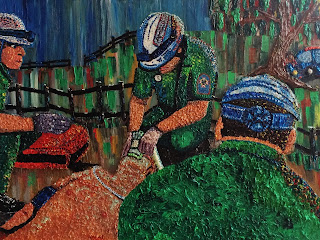The Trauma of Trauma
Artist : Andrew Martin (Intensive Care Paramedic)
Nothing can truly prepare you for dealing with human suffering. Some of us choose careers where we can try and make a difference, to help others. They are important jobs, needed. However, somewhere along the way you can become lost, haunted, transformed by the very nature of the job that called you in. Working in emergency services is a difficult job, but a job that will always be there, always needed.
As paramedics we are highly trained and prepared for anything and everything, that's what we signed up for and that's what we get. But there really is no way to prepare for the reality of working with vulnerable broken people, if you do it long enough you are at a risk of crossing over that line. The line that you hold an arms length away, the one that keeps you sane. The longer you expose yourself to this work the harder it is to hold up your arm and keep away the sadness. It becomes heavier and heavier with the weight of what you have seen, the suffering you have shared. Each job can chip a bit more of you away, if you let it.
We have to look out for each other, we share a black humour that outsiders can not understand. We gravitate to those that can share in our stories, our experiences. We huddle at the back of ambulances and commiserate, we understand, we share, we laugh, we gossip, spreading the memories, offloading to colleagues. But you always keep a little bit for yourself, that part of you that still hasn't dealt with what you have seen, the memories are fresh. We push it aside and file it away in a place deep inside, one we don't want to access. But it's always there. It's there when we drive past the memorials left on the side of the road, everyone else sees a cross but we see the real picture, the broken people, the crushed cars the sounds of silence. After a while there aren't many roads you can travel, suburbs you can visit; alone - the memories follow, they stick like glue. For some it can get so you can't get away, they are there day and night. The nights are long, broken, filled with nightmares. The days are filled with reminders, the exhaustion builds and the years of suppressing emotions changes who you were. You can get lost inside a world in your head, if you let it. If you don't have the support and understanding. We are at risk of abusing alcohol and drugs to try and make it stop, even for a moment, if you let it. Families suffer, partners suffer, the effects spread, if you let it. We need to stop and think of the reality of what we do, we need to let it out and not let it build up. We need to look out for each other. It's the type of job that has a ticking clock, one that you need to watch carefully and know when it's time to go, before you are lost completely. Before it's too late.
Post Traumatic Stress Disorder (PTSD) is more common that anyone realises with emergency services workers, we are not immune but we are often in denial. PTSD particularly involves four types of problems: re-living traumatic events; being highly alert or wound up and usually with sleeping difficulties; avoidance of reminders of traumatic events; and becoming emotionally numb see Beyond Blue for more facts
After an increase in paramedic and emergency services suicides in Western Australia paramedics set up their own charity to help support all emergency services workers called Sirens of SilenceThe first step is to recognise it, to talk about it, we need to deal with it before it deals with us. Look out for our colleagues, be aware of the signs of PTSD. Don't suffer in silence...
